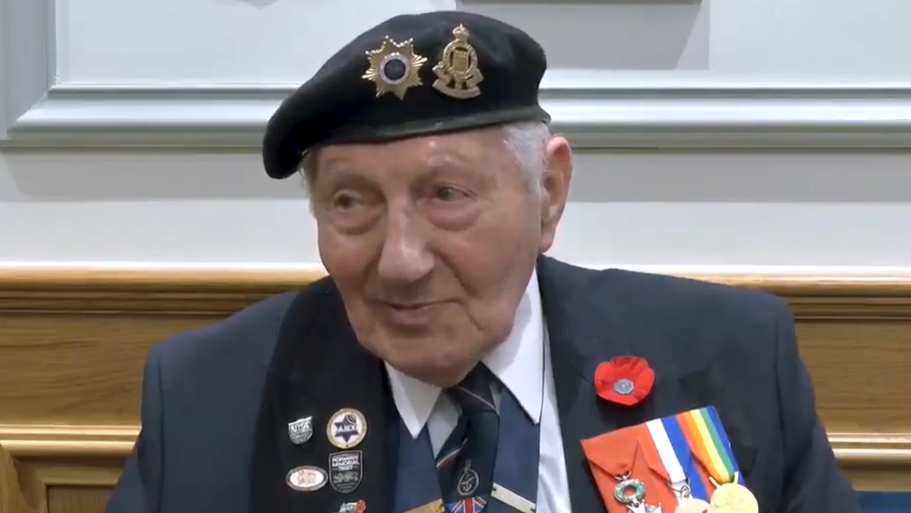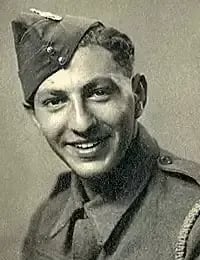Meet Marvin Kersh, a 99-year-old veteran whose steadfast commitment to his faith during World War II is quite notable. As a young soldier in the British Army, Kersh faced more than just the enemy; he also confronted his own commanders over his refusal to eat non-kosher food. Defiance nearly led to his detention, as his commander suspected him of trying to weaken himself to avoid combat. Kersh, then just 19, explained his adherence to kosher laws, ultimately convincing the officer of his dedication to fighting Nazis. Consequently, Kersh was spared a court martial and subsisted largely on canned fruits throughout the war.
"I told the officer that avoiding the fight was the last thing on my mind," Kersh recounted in a blog for war veterans. "I explained kosher laws for an hour. My conviction won him over, and the trial was canceled." Shortly thereafter, Kersh joined his comrades on a battleship, landing at Normandy Beach shortly after the D-Day operations commenced on June 6, 1944.
Kersh recently revisited France for the 80th anniversary of the Normandy invasion, a pivotal battle that signaled the beginning of the end for Nazi dominance in Europe. Among the dwindling number of surviving WWII veterans, Kersh stood out, joined by a few other war heroes and notable figures like U.S. President Joe Biden, French President Emmanuel Macron and Ukrainian President Volodymyr Zelensky.
Growing up in a Jewish family in South London, Kersh had dual motivations to combat Hitler's forces. Beyond the direct threat to Britain and the bombings that claimed nearly 30,000 lives in London, there was a profound awareness of the Nazis' genocidal campaign against Jews across Europe. "We knew about the atrocities, but not the full extent. We knew about the gas chambers, the shootings, and the hangings," Kersh reflected.
This dire knowledge spurred British Jews to enlist in significant numbers during the war. Statistics reveal that around 70,000 Jews, or 18% of the Jewish population in the UK, served in the British Forces, compared to 11% of the general population.
Kersh's wartime duties involved ensuring a steady flow of vehicles, from motorcycles to massive tank carriers, to support British Army units headed to Berlin. As he traversed Europe, he witnessed the devastating impact of the war on Jewish communities. The liberation of the Bergen-Belsen concentration camp on April 15, 1945, revealed about 60,000 emaciated prisoners and thousands of unburied corpses.
Stationed nearby weeks later, Kersh visited the camp but was barred from entering due to the rampant typhus infection. Outside the gates, he encountered skeletal former prisoners still clad in their camp uniforms. In an effort to help, Kersh distributed chocolate collected from fellow soldiers, a gesture that brought joy to the survivors but later haunted him. "I later learned that giving chocolate to starving people was the worst thing to do. How many died because of it? I don't know. But I didn't know that at the time," he lamented.
Kersh found that the survivors were unanimously determined to move to Israel, not a single one wishing to return to their former homes in Europe. "They were Jews and wanted to live in a Jewish state," Kersh said, recalling the small Zionist flag he wore on his lapel with pride.
His desire to join the Jewish Brigade notwithstanding, Kersh was too young, as only those over 23 were eligible. In recent years, he has shared his story with schools and community organizations, emphasizing the dangers of antisemitism and the importance of standing up to tyrants.
Invasion of Normandy
(http://www.youtube.com/watch?v=fhsYY7SY55Q)
In his blog, Kersh recounted a poignant meeting with two Jewish brothers who survived the Nazi regime after their parents were murdered. "The language barrier limited what I learned about their suffering before they escaped Germany. The Germans took their older family members, and they never saw them again," he recalled.
Reflecting on D-Day, Kersh remembered the anticipation of the Allied invasion and the inspiration drawn from the Jewish resistance in the Warsaw Ghetto. "Their fight against the Germans inspired every Jew worldwide. It was the first massive resistance in Europe and lasted much longer than the German high command expected," he said.
Kersh also recounted a Rosh Hashanah prayer organized by military rabbi Dr. Louis Rabinowitz in 1944, attended by Jewish soldiers and two Jews who had been hiding for years. "One had spent almost the entire time in a wardrobe, the other in an attic. They spoke Yiddish, and it was translated for hundreds of soldiers from several Allied countries," he said.






